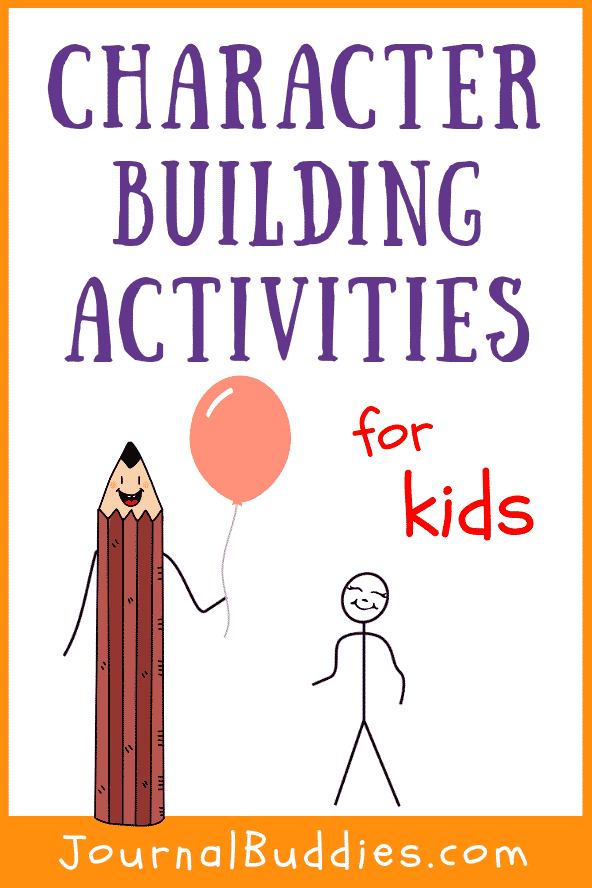Character Building for Kids— Teaching kids to have good morals and values isn’t easy, but it is perhaps one of the most important jobs that parents and teachers have. In order to instill good values from a young age, we recommend using character-building activities that teach things like empathy, kindness, respect, and honesty.

Character building activities that focus on these traits and others create foundational life skills that will help kids develop a strong sense of character and serve them throughout their entire lives.
Developing and Supporting Emotional Intelligence
Character building activities also serve to strengthen a child’s emotional intelligence. Emotional intelligence is defined as “the capacity to be aware of, control, and express one’s emotions, and to handle interpersonal relationships judiciously and empathetically.”
This skill is clearly one that will be more important as kids get older, but consider this:
When emotional intelligence is enhanced and strengthened from a young age, kids will be better prepared to address the challenging situations they face in adolescence and in their adult years.
They’ll also grow up happier and more well-adjusted because they’ll be equipped with the right skills and tools they need to deal effectively with life from the start.
With this in mind, let’s take a look at some character building activities that help kids learn essential moral values like compassion and understanding.
Our Top 2 Character Building Activities to Teach Kids Important Life Values
In order to raise responsible and emotionally resilient children, it’s best to teach them early on about other people’s feelings and beliefs. Kids will meet a lot of different people throughout their lives—and they must learn how to interact with them with respect and kindness.
Which is why…
We’ve created five simple character building activities you can share with children to teach them compassion, understanding, and other important life values.
1. Treat Others with Kindness
One fabulous way to teach compassion and understanding to your kids is to demonstrate that you are genuinely interested in others when you are interacting with people. When you demonstrate kindness and interest in others and what they have to say, kids will see your behavior and follow your example.
Show kids how to treat others respectfully by making a point to model positive interactions with everyone you meet—including cashiers, neighbors, teachers, family members, and friends.
Ask everyone in your household to keep a running tally for a day, week, or month of each time they showed compassion, kindness, and understanding to others (and how they demonstrated it to the other person).
When you’re finished, share your experiences with one another and discuss what you learned.
2. Learn from the Past
As a culture, we tell stories and fables over and over again that can teach us something about morals and lessons that others have learned before us. We do so to remember where we came from—but also so that we may learn from the mistakes and struggles of others and pave a better path forward for ourselves.
You can make this character building activity especially personal by taking the time to share stories about your relatives and ancestors with your children. They’ll get to learn about past and present family members and their unique life stories—and they may feel inspired to model their behavior after the people who came before them who did such great things.
For extra fun, you can even do some family-themed arts and crafts together while you tell stories! Consider making a family tree, a photo album, or a small book with written stories and remembrances.
Three More Activities to Build Character
3. Seek Out Diversity
The world is a big and beautiful place, and people are living all sorts of different lives across it. However, your child may not understand much about what life is really like for people who live differently from him or her. Understanding that others have their own unique experiences—and their own values and ideals—is a big part of developing empathy and respect for others.
To expose your child to some other ways of life, take him or her to a library or museum with the goal to explore cultural materials and expand your worldviews.
As you learn about other cultures, help your child see that people from other parts of the world (and even other parts of the country) have their own traditions and ideas that are unique and fascinating. No one’s culture is more valuable or “right” than anyone else’s… they are all just different ways of life that have evolved over time.
Hint: If you’re looking for more character building activities like this one, you can search for “diversity activities” online and find more resources on the topic!
4. The Power of Words
Another simple yet highly effective character building activity you can share with your child is teaching him or her about character words.
Sometimes, kids recognize positive character traits and behaviors but they simply don’t have the language to label them. By teaching kids how to describe these behaviors with the proper terms, they’ll be able to recognize more readily when they exhibit good character on their own—and they’ll also start to see when others are treating them with these same values.
To make these lessons interactive, try making a collage or painting about a single character word with images that depict what the trait means or looks like in action. You can also try writing a story or poem that ties several character traits together—either the traits your child already possesses and does well, or perhaps the traits your child would like to improve upon.
Use the following word list to guide your character-building activity:
- Attentive
- Compassionate
- Confident
- Considerate
- Content
- Cooperative
- Courageous
- Diligent
- Empathetic
- Fair
- Friendly
- Helpful
- Honest
- Integrity
- Kind
- Respectful
- Self-confident
- Understanding
5. Keep a Character Journal
Once your child has started to learn about different types of character traits and why they are so important, you may want to keep a character building journal to record your experiences together and to track the activities you shared.
A journal is also a great way for your child to reflect on the new traits he or she learns about—as well as to examine instances where someone displayed (or should have displayed) these traits.
10 Character Building for Kids Journal Prompts
Use these prompts to get your character building journal started:
- What does it mean to have good character?
- Write about a time when you or someone you know showed integrity.
- Is it ever difficult to show kindness? How can you work to be kind even when it’s hard?
- What is empathy? How do you show empathy to others around you?
- Write about a time when you helped someone else even though you didn’t have to.
- Why is honesty an important value to have?

- What are some good ways that you can cooperate with others when a conflict arises?
- Write about someone in your life whom you consider to have good character. What makes you look up to that person?
- What does it mean to show someone respect?
- What type of character do you want to have when you grow up? List some of the specific traits that are most important to you.
As you and your child work on these simple character building activities together, you’ll both learn more about values, morals, and character—and you’ll also cultivate a closer relationship with one another in the process.
Here’s to taking action to build strong character in your child today!
Until next time, write on…
If you enjoyed these Character Building Activities for Kids,
please share them on Facebook, Twitter, and/or Pinterest.
I appreciate it!
Sincerely,
Jill
journalbuddies.com
creator and curator

More Kid Character Building Activities Resources for You
- What is Good Character?
- Character Education Lesson Plans
- 25 Activities for Building Student Character
- Character Education Ideas & Activities
- 17 Dynamic Writing Prompts About Respect
The following article was originally published Nov, 2012 and may be of interest to our readers today.
Elementary Character Education
The truth of the matter is that elementary character education usually starts at home, but it should also be noted that schools play an important role in the development of a child’s character as well. Most of the values learned at home will be honed in school, and as such, it is important for educators to prioritize character education just like other school subjects.
Teachers, especially those who are handling classes involving young children, can use a variety of ways to enhance and promote positive values to develop a child’s character. One of the most effective ways is to integrate character education into regular lessons, as this is the time when children can absorb the information organically.
How to Teach Character Education to Kids
A popular way to teach elementary character education is by involving students in role-playing activities. Have them play the role of an actor, business professional, doctor, or the President of the United States in a short presentation. Thereafter discuss with the students the values and traits that each character in the skit possessed. A fun atmosphere combined with lessons on character will surely have an impact on their young minds.
Reading is another way that you can teach elementary character education without being too serious about it. Let the children choose a storybook from a list of titles that you have pre-selected and read the story for their benefit. Afterward, discuss the main points of the story and point out the positive qualities and traits that they can emulate. Ask them to participate in the discussion and let them share what they think the lesson of the story is all about. Young children absorb more information when they participate in these types of activities, especially when they are given recognition after sharing their opinions on the subject.
Lastly, encourage parents to participate in their children’s character development. Parents are deemed the first teachers of any child, and so you must work hand in hand with them to reinforce the values and positive attributes you are teaching in school. Establish a regular line of communication with the parents of your students to let them know that you are really sincere in helping them raise well-developed kids. Encourage them to participate in school activities as often as they can, as this will also have a positive impact on the students.





